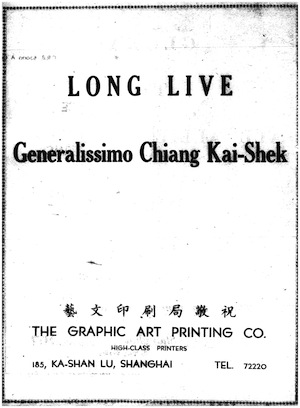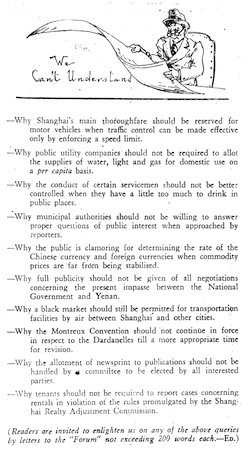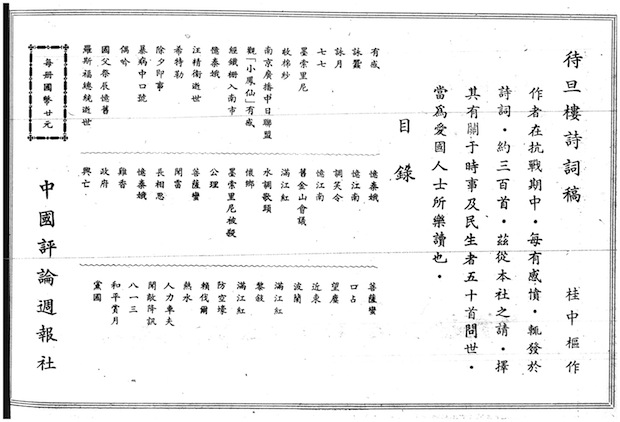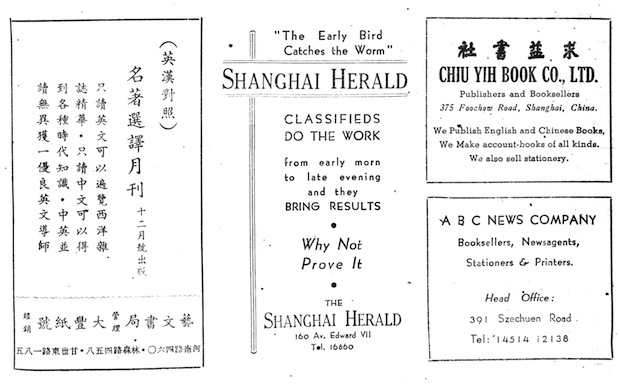FEATURES
The China Critic - 1945 | China Heritage Quarterly
The China Critic: a Chronology
William Sima
Australian Centre on China in the World
William Sima, whose research into the history and contents of The China Critic led to this combined issue of China Heritage Quarterly, has created a Chronology of the weekly. It follows the progress of The Critic from its first appearance in May 1928 through the highs and lows of the 'Nanjing Decade', and then through its various wartime permutations.
Will's Chronology, which is arranged by year below, accounts for the changing fate, and the friable editorial stance, of The Critic. It also provides numerous links to the articles under discussion allowing for them to be appreciated in an historical context.—The Editor
1928 | 1929 | 1930 | 1931 | 1932 | 1933 | 1934 | 1935 | 1936 | 1937 | 1938 | 1939 | 1940 | 1945
1945
23 August

Fig.1 'Love Live Generalissimo Chiang Kai-shek!' Victory slogan advertisements like this frequently appeared in the pages of The China Critic in its last year.
Eight days after the official Japanese surrender, The China Critic returns to print after almost five years. The short announcement 'Once Again' reintroduces the newspaper, quoted here in full:
In November 1940, this journal acted upon 'advice' and suspended publication. Today it makes its appearance again. The lapse of five years will not change the policy which it pursued for more than a decade. On account of lack of printing facilities, high cost of labor and newsprint and absence of most of our regular contributors, only a skeleton edition is offered. As soon as circumstances permit, it will be our earnest desire to restore this journal to its full stature.
At its peak in the early to mid 1930s, The China Critic was regularly thirty pages long. This issue contains just six pages of editorials and special columns.
'Let's Be Magnanimous' describes Chiang Kai-shek's victory address and urges compassion towards the Japanese people, as opposed to 'their war mongers.'
In 'Merciful Killing' Kwei Chung-shu 桂中樞, who has returned as editor, likens the atomic bomb to euthanasia, abortion and the last Ming emperor Chongzhen 崇禎, who murdered his daughter to preserve her honour from the Qing invaders. Speaking out against 'parlor politicians and pacifists', he defends the bomb on utilitarian grounds:
Personally I hate war as much as any sane person, and I do not talk about the atomic bomb lightheartedly or callously. Yet to me the atomic bomb is up to the moment the most practical means to outlaw war and to restrain any nation from going to war… . With an international organization for peace as envisaged at the San Francisco Conference and with an effective weapon like the atomic bomb as the safeguard, mankind may feel at ease once again. Indeed, the atomic bomb has brought peace to the world; it may keep the world in peace.
6 September

Fig.2 'We Can't Understand', 6 December. This year The China Critic called for readers to contribute to such advertisements for the Contents page.
This issue leads with an 'In Memoriam' for P.K. Chu 朱少屏, who served as business manager of The China Critic from 1928 to 1940. Murdered in Manila by the Japanese in 1942, his remains were recently identified by representatives of the National government:
As consul in the Philippines [Chu] was known to have earned the admiration and gratitude of the overseas Chinese whose interests he endeavored to promote. When the Pacific war broke out, he could not help giving full expression to his patriotic spirit and in consequence incurred the full wrath of the Japanese invaders.
Also in this issue, Woo Kyatang 吳嘉棠 predicts 'A New Era for the Free Press in China': 'In the bright era of freedom ahead of us, China's newspapers and newspapermen must face a new responsibility.' Woo proposes that a 'new type of newspaperman', who works for public weal and not for his own pocket, will be needed if China is to take full advantage of this era of peace:
You will hear 'freedom of speech' shouted by long-haired demagogues from one soap-box to another. And pretty soon in a moment of sane quietude, you will ask yourself what all these slogans mean. They do not mean a thing as long as they remain slogans. Freedom of speech is not a gift all wrapped up and ready for use which comes just for the asking and slogan-yelling. It is something to be worked for, for which we must make sacrifices.
20 September
'Die-hards Go Home' describes a new breed of foreign chauvinists 'who have emerged from concentration camps and discovered a new set of circumstances not to their liking'—the end of extraterritoriality laws.The writer of this Editorial includes a number of 'quotations' from interviewed die-hards, which sound rather spurious: ' "We can't give China freedom", says one of them, "We have done so many wrongs in the past that once given a free hand she may try to get even with us" '.

Fig.3 Advertisement for 《 待旦樓詩詞稿》 ('Draft Lyric-poems from the Pavilion of Waiting for the Dawn'), a collection of wartime poetry by The China Critic editor, Kwei Chung-shu 桂中樞, 11 October
�
11 October
This year's editorial commemorating the Double Ten anniversary of the founding of the Republic of China is reminiscent of that of fifteen years ago, 'The Chinese Republic Enters her Twentieth Year' (see 16 October 1930). But while that article looked back upon twenty years of indigenous warlordism and failed revolution, 'China in Perpetual Revolution' this year emphasizes the external sources of humiliation: the Manchu Qing dynasty, the Japanese, and the treaty system which followed the Opium War:
On this day of days, the nation may proudly rejoice over the dual event of overthrowing an alien rule lasting 300 years and conquering a traditional foe of fifty years standing. The Sleeping Lion has at long last awakened; its roar echoing and re-echoing throughout the universe and will continue to echo for centuries to come—if the people will at all times bear in mind the lessons that the history of 100 years of humiliation has taught them, and if they will keep the nation in a state not of stagnation but of revolution, peaceful but virile, constructive and not destructive, with malice to none but with goodwill to all.
25 October
In his article 'New Intellectual Ferment in China—Part 1', the first of three, C.Y.W. Meng 孟張泳 discusses a healthy appetitefor 'Spiritual Food'—magazines, books and new translated biographies of world leaders—among Chinese readers. Meng also describes the insatiable demand for English dictionaries and conversation books, 'not because of the demand for "Interpreters" for the Allied army in China, but because of one distinct reason—the world-mindedness of the Chinese youths'. With regard to contemporary Chinese literature, Meng contends that Ba Jin 巴金, Guo Moruo 郭沫若 and Mao Dun 茅盾 'are the best writers in China' in the mind of the reading public, citing a number of their works which are particularly popular.
8 November
In 'The Chinese Chiu-pa (丘八)' P.C. Lin 林步基 describes the daily wartime life and post-war mistreatment of the common Chinese soldier, contrasting him with popular European stereotypes:
This term consists of the two component parts of the Chinese character 兵 Ping'—a soldier. When the English and French speak of their "Tommy" or "Poilu", it is with a feeling of familiarity if not endearment, but when Chinese speak of their "Chiu-pa" however, it carries a sense of disrespect and even contempt.
29 November
While not officially a 'special issue', this week's The China Critic—now with 'More Pages with New Features Added'—contains a number of articles about education. The Editorial 'The Need for Educational Reform' describes a number of problems confronting educationalists in Shanghai, including the need to reopen universities, to establish a 'Student Aid Fund' for the support of poor students, and to reconsider the rote-learning style of education: 'Nobody bothers to find out of he understands what he learns—it is not even considered important'.
C.L. Kwei 桂質良, 'In her varied capacity as a mental hygienist, a mother of adolescents and a teacher in secondary schools', offers a critical survey of the problems particular to educating young adults in herspecial article 'Adolescent Education'.
In 'Reconstruction of China's Post-War Education', V.L. Wong 黃維康 offers a number of suggestions on the urgent need for new government education policy, which include 'the need of a free universal education', and 'enforcing military training on an extensive basis'. Wong considers education to be the third most important aspect of China's reconstruction:
Next to political unity and economic stability, there is the immediate need of nation-wide education reconstruction, about which nothing definite has been announced … education, being the most basic of all constructive forces, merits our gravest consideration.
13 December
C.L. Kwei 桂質良 returns to promote the concept of 'Mental Hygiene Education' for young adults:
[Mental hygiene] is the science which analyzes, correlates and integrates the various influences and drives in an individual to fit them into a harmonious whole. It accepts a person as he is, with his particular heredity, environment, and his intellectual and emotional make up, and tries to understand why he behaves the way he does, in order to guide him to a richer and fuller life.
Kwei proposes a three-part plan for implementing this education, which consists of 'child guidance clinics where parents, kindergarten and primary school teachers may seek information'; 'mental hygiene lectures in all high schools'; and a 'special consultation service' for college students, pre-marriage couples, expectant parents and middle-aged women.

Fig.4 Bilingual advertisements: on the left is one for Translation Monthly 翻譯月刊, a magazine that printed English and Chinese essays en face, 13 December
�
27 December
Some of Lin Yutang's most celebrated 'Little Critic' and Analects Fortnightly essays spoke of the joys of smoking cigarettes. In this final issue of The China Critic a writer by the name of Peter Chang takes up the theme with an essay titled 'Cigarettes'.
1928 | 1929 | 1930 | 1931 | 1932 | 1933 | 1934 | 1935 | 1936 | 1937 | 1938 | 1939 | 1940 | 1945
|